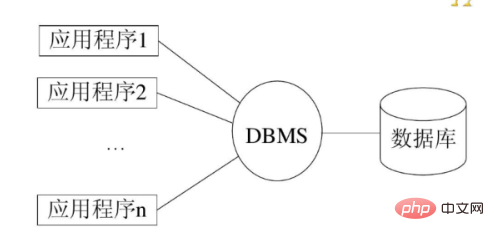What is the software system that supports various database operations?

What is the software system that supports various database operations?
The software system that supports various operations of the database is called a database management system.
Database Management System (DBMS) is a large-scale software that manipulates and manages databases and is used to establish, use and maintain databases. It provides unified management and control of the database to ensure the security and integrity of the database. Users access data in the database through dbms, and database administrators also perform database maintenance through dbms.
It provides a variety of functions that enable multiple applications and users to use different methods to create, modify and query the database at the same time or at different times. It enables users to easily define and manipulate data, maintain data security and integrity, and perform concurrency control and database recovery under multi-user conditions.

Extended information
According to functions, the database management system can be roughly divided into 6 parts:
(1) Schema translation: Provides data definition language (ddl). Database schemas written in it are translated into internal representations. The logical structure, integrity constraints and physical storage structure of the database are stored in the internal data dictionary. Various data operations of the database (such as search, modification, insertion and deletion, etc.) and database maintenance and management are based on the database schema.
(2) Application program compilation: Compile the application program containing database access statements into a target program that can be run with the support of dbms.
(3) Interactive query: Provides easy-to-use interactive query language, such as sql. The dbms is responsible for executing query commands and displaying the query results on the screen.
(4) Data organization and access: Provide physical organization and access methods of data on peripheral storage devices.
⑸Transaction operation management: Provides transaction operation management and operation logs, transaction operation security monitoring and data integrity check, transaction concurrency control and system recovery and other functions.
(6) Database maintenance: Provide software support for database administrators, including maintenance tools such as data security control, integrity assurance, database backup, database reorganization, and performance monitoring.
The above is the detailed content of What is the software system that supports various database operations?. For more information, please follow other related articles on the PHP Chinese website!

Hot AI Tools

Undresser.AI Undress
AI-powered app for creating realistic nude photos

AI Clothes Remover
Online AI tool for removing clothes from photos.

Undress AI Tool
Undress images for free

Clothoff.io
AI clothes remover

Video Face Swap
Swap faces in any video effortlessly with our completely free AI face swap tool!

Hot Article

Hot Tools

Notepad++7.3.1
Easy-to-use and free code editor

SublimeText3 Chinese version
Chinese version, very easy to use

Zend Studio 13.0.1
Powerful PHP integrated development environment

Dreamweaver CS6
Visual web development tools

SublimeText3 Mac version
God-level code editing software (SublimeText3)

Hot Topics
 1664
1664
 14
14
 1423
1423
 52
52
 1317
1317
 25
25
 1268
1268
 29
29
 1244
1244
 24
24
 iOS 18 adds a new 'Recovered' album function to retrieve lost or damaged photos
Jul 18, 2024 am 05:48 AM
iOS 18 adds a new 'Recovered' album function to retrieve lost or damaged photos
Jul 18, 2024 am 05:48 AM
Apple's latest releases of iOS18, iPadOS18 and macOS Sequoia systems have added an important feature to the Photos application, designed to help users easily recover photos and videos lost or damaged due to various reasons. The new feature introduces an album called "Recovered" in the Tools section of the Photos app that will automatically appear when a user has pictures or videos on their device that are not part of their photo library. The emergence of the "Recovered" album provides a solution for photos and videos lost due to database corruption, the camera application not saving to the photo library correctly, or a third-party application managing the photo library. Users only need a few simple steps
 How does Hibernate implement polymorphic mapping?
Apr 17, 2024 pm 12:09 PM
How does Hibernate implement polymorphic mapping?
Apr 17, 2024 pm 12:09 PM
Hibernate polymorphic mapping can map inherited classes to the database and provides the following mapping types: joined-subclass: Create a separate table for the subclass, including all columns of the parent class. table-per-class: Create a separate table for subclasses, containing only subclass-specific columns. union-subclass: similar to joined-subclass, but the parent class table unions all subclass columns.
 Detailed tutorial on establishing a database connection using MySQLi in PHP
Jun 04, 2024 pm 01:42 PM
Detailed tutorial on establishing a database connection using MySQLi in PHP
Jun 04, 2024 pm 01:42 PM
How to use MySQLi to establish a database connection in PHP: Include MySQLi extension (require_once) Create connection function (functionconnect_to_db) Call connection function ($conn=connect_to_db()) Execute query ($result=$conn->query()) Close connection ( $conn->close())
 How to handle database connection errors in PHP
Jun 05, 2024 pm 02:16 PM
How to handle database connection errors in PHP
Jun 05, 2024 pm 02:16 PM
To handle database connection errors in PHP, you can use the following steps: Use mysqli_connect_errno() to obtain the error code. Use mysqli_connect_error() to get the error message. By capturing and logging these error messages, database connection issues can be easily identified and resolved, ensuring the smooth running of your application.
 How to use database callback functions in Golang?
Jun 03, 2024 pm 02:20 PM
How to use database callback functions in Golang?
Jun 03, 2024 pm 02:20 PM
Using the database callback function in Golang can achieve: executing custom code after the specified database operation is completed. Add custom behavior through separate functions without writing additional code. Callback functions are available for insert, update, delete, and query operations. You must use the sql.Exec, sql.QueryRow, or sql.Query function to use the callback function.
 How to save JSON data to database in Golang?
Jun 06, 2024 am 11:24 AM
How to save JSON data to database in Golang?
Jun 06, 2024 am 11:24 AM
JSON data can be saved into a MySQL database by using the gjson library or the json.Unmarshal function. The gjson library provides convenience methods to parse JSON fields, and the json.Unmarshal function requires a target type pointer to unmarshal JSON data. Both methods require preparing SQL statements and performing insert operations to persist the data into the database.
 How to connect to remote database using Golang?
Jun 01, 2024 pm 08:31 PM
How to connect to remote database using Golang?
Jun 01, 2024 pm 08:31 PM
Through the Go standard library database/sql package, you can connect to remote databases such as MySQL, PostgreSQL or SQLite: create a connection string containing database connection information. Use the sql.Open() function to open a database connection. Perform database operations such as SQL queries and insert operations. Use defer to close the database connection to release resources.
 PHP connections to different databases: MySQL, PostgreSQL, Oracle and more
Jun 01, 2024 pm 03:02 PM
PHP connections to different databases: MySQL, PostgreSQL, Oracle and more
Jun 01, 2024 pm 03:02 PM
PHP database connection guide: MySQL: Install the MySQLi extension and create a connection (servername, username, password, dbname). PostgreSQL: Install the PgSQL extension and create a connection (host, dbname, user, password). Oracle: Install the OracleOCI8 extension and create a connection (servername, username, password). Practical case: Obtain MySQL data, PostgreSQL query, OracleOCI8 update record.



